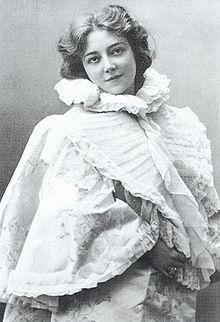Anna Held (Stage Performer)
 Helene Anna Held (March 8, 1873 – August 12, 1918) was a Polish-born stage performer, most often associated with impresario Florenz Ziegfeld, her common-law husband.
Helene Anna Held (March 8, 1873 – August 12, 1918) was a Polish-born stage performer, most often associated with impresario Florenz Ziegfeld, her common-law husband.
Born in Warsaw, Congress Poland, Russian Empire she was the daughter of a Jewish glove maker, Shimmle (aka Maurice) Held, and his French-Jewish wife, Yvonne Pierre.
Sources of her year of birth range from 1865 to 1873. In 1881, anti-semitic pogroms forced the family to flee to Paris, France.
When her father's glovemaking business failed, he found work as a janitor, while her mother operated a kosher restaurant.
Held began working in the garment industry, then found work as a singer in Jewish theatres in Paris and, later, after her father's death, London, where her roles included the title role in a production by Jacob Adler of Abraham Goldfaden's Shulamith; she was also in Goldfaden's ill-fated Paris troupe, whose cashier stole their money before they ever played publicly.
Her vivacious and animated personality proved popular, and her career as a stage performer began to gain momentum. She was soon known for her risqué songs, flirtatious nature and willingness to show her legs on stage.
Around this time, she became the wife of a much-older Uruguayan playboy, Maximo Carrera, with whom she had a daughter, Liane (1895–1988), shortly after their 1894 marriage, and who became an actress and producer, sometimes billed as Anna Held, Jr.
Touring through Europe she was appearing in London in 1896 when she met Florenz Ziegfeld. Ziegfeld asked her to return to New York City with him and she agreed. He set about creating a wave of public interest in her, by feeding stories about her to the American press. By the time Held and Ziegfeld arrived in New York, she was already the subject of intense public speculation. When she finally performed, the critics were dismissive of her, but the public liked her.
From 1905 Held enjoyed several successes on Broadway which apart from bolstering Ziegfeld's fortune, made her a millionaire in her own right. Ziegfeld's talent for creating publicity stunts ensured that Held's name remained well known. Held suggested the format for what would become the famous Ziegfeld Follies in 1907, and helped Ziegfeld establish the most lucrative phase of his career.
Held could not perform in the first Follies in 1908 as she had become pregnant by Ziegfeld. She later miscarried or had an abortion. In 1909 he began an affair with the actress Lilliane Lorraine. Held remained hopeful that his fascination would pass and he would return to her, but instead he turned his attentions to another actress Billie Burke, whom he would marry in 1914.
Held spent the years of World War I working in vaudeville, and touring France, performing for French soldiers and raising money for the war effort. She came to be regarded as a war heroine for her contributions, and was highly regarded for the courage she displayed in travelling to the frontline to be where she could do the most good.
She returned to the United States and starred in the film Madame le Presidente (1916). Shortly afterwards her health began to fail. She collapsed onstage in 1918 and died after a few months from multiple myeloma at age 45. She is interred at Cemetery of the Gate of Heaven in Hawthorne, New York. Ziegfeld was castigated by the media he had so studiously courted, for his mistreatment of Held and apparent indifference to her illness, and his notable absence from her funeral.
The film The Great Ziegfeld (1936) tells a sanitized version of the story of the Ziegfeld-Held relationship. Luise Rainer won an Academy Award for her performance as Held. Ziegfeld and Burke were played by William Powell and Myrna Loy. In 1978 Columbia Pictures released Ziegfeld: The Man & His Women. This was a much more open and perhaps truthfully told movie about Ziegfeld and the women in his life, than the 1936 film. Anna was portrayed by Barbara Parkins.
The American poet Carl Sandburg wrote a memorial poem for Anna Held after Held's death, An Electric Sign goes Dark, in the collection Smoke and Steel.
In 1976 Anna Held's daughter, Liane Carrera (died 1988), opened a museum of her mother's personal and stage items in San Jacinto, California. The museum was looted by robbers and all the displayed material was stolen a few years after it opened.
- Tags: actress entertainment
Related Articles
- Nicki Minaj (Singer/Rapper/Performer)
- Annie Lennox (Performer/Mom/Activist)
- Marlene Dietrich (Actress/Singer)
- Audrey Hepburn (Actress)
- Josephine Baker (Dancer/Singer/Actress)
- Hedy Lamarr (Actress/Inventor)
- Eve Ensler (Playwright/Performer/Feminist/Activist)
- Judy Garland (Actress)
- Lauren Bacall (Actress/Model)
- Sophia Loren (Actress)